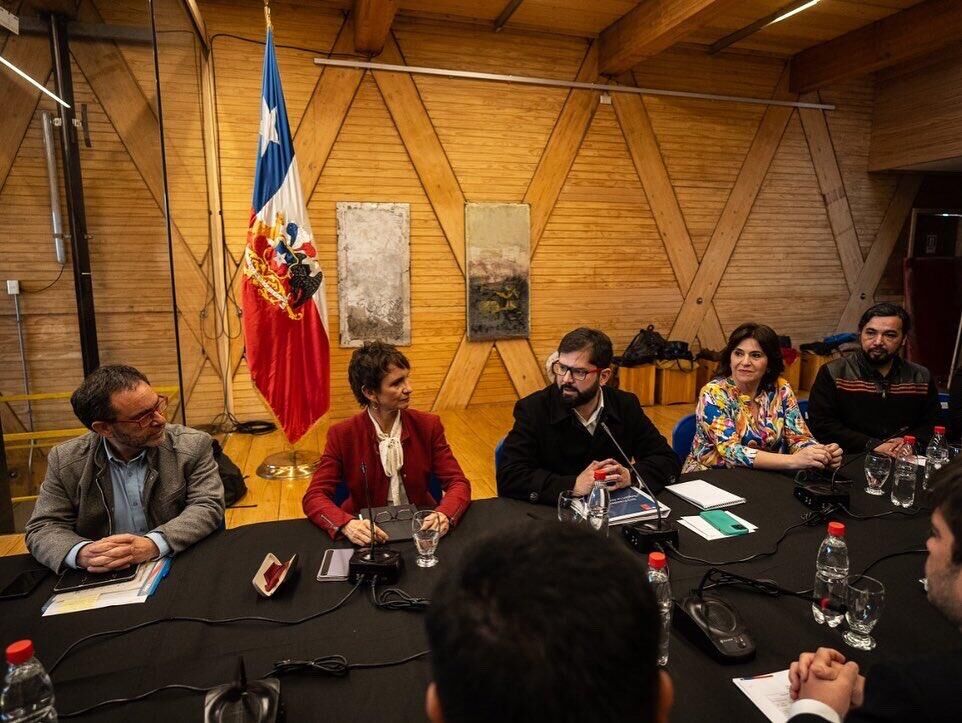The Chilean president traveled to La Araucanía, a zone of territorial conflict between settlers, logging companies and Mapuche communities, and where there have been arson attacks that, according to Boric, remind him of “Nazi” violence.
The Arauco Malleco Coordinator, which vindicates the Mapuche cause, considered the official visit “a provocation.”
President Gabriel Boric traveled for the first time in nine months of his mandate to the region of La Araucanía, 700 kilometers south of Santiago, an area historically belonging —together with the regions of Biobío, Los Lagos and Los Ríos— to the Mapuche nation, which claims the restitution of ancestral lands as the main axis of its struggle.

“We began the tour to La Araucanía to strengthen interministerial work based on the priorities of our Government in the region, with the focus on people and their safety,” the president wrote on social networks.
Boric’s arrival in the area occurs in a context of rejection of the president by groups claiming the Mapuche cause such as the Arauco Malleco Coordinator (CAM) and arson attacks that destroyed a school and a heritage church in the area.
The president compared the arson attacks in the area with the actions “of the Nazis in the 1930s”, calling them “terrorist acts” and those responsible as “cowards”, who will not intimidate him or his government.
“You know what the burning of the school and the church that we saw today reminds me of? It reminds me of when in the 1930s the Nazis burned synagogues (…) I do not want to enter into a semantic controversy regarding this I think it does us a lot of damage. I think there have been acts of a terrorist nature in the region,” he stressed.
Boric’s visit, confirmed late on November 9 for security reasons due to arson incidents, has drawn criticism, including for staying in a military regiment in the area.
“I want to tell the people who are behind these attacks that by depriving the children of education or of a temple where the people of La Araucanía can practice their faith, they are not going to be able to intimidate me or my government (…) they are cowards,” Boric said, according to the Chilean media outlet El Mercurio.
The CAM issued a statement on Wednesday the 9th through social networks to reject and “sabotage” the president’s first trip to the area.
“His trip to the Wallmapu [Mapuche nation, in Mapudungun] is due to the interests of the oligarchy, to the power of the economic groups that directly confront the Mapuche cause, since under his government the structures of domination that we have historically fought,” said CAM.
“Boric will step on our ancestral territory, while extractivist projects expand in it and the prisons are filled with political prisoners for defending territory and the freedom of our nation, which confirms the Government’s decision to consolidate a neo-fascist strategy to combat the Mapuche movement. They are the landowners, settlers and forestry entrepreneurs whom Boric intends to leave alone with his visit,” they point out.
President Boric has renewed the state of emergency in the region 11 times since taking office, despite the fact that in the past he has claimed to be against this security measure since his predecessor Sebastán Piñera (2010-2014, 2018-2022 ) declared it for the first time in October 2021.
From the president’s environment, they point out that the main thing about the visit is the search for a dialogue “with non-violent communities”, and advance in public policies of infrastructure, land restitution and rural development.
“The vast majority of those who live in La Araucanía and the vast and overwhelming majority of the Mapuche people want peace and we are going to dialogue with them,” said Boric.
The former mayor of Temuco, capital of the Araucanía region, and former deputy René Saffirio told the Vía X channel that “not even the Carabineros are interested in resolving this conflict,” because “they have made a business out of this conflict.”
Saffirio maintained that for the logging companies in the area and the security forces “it is important that the conflict continues, because those who have an interest in exploiting logging areas have a criminal network behind them in the sense of selling security to that businessman who wants to exploit the area.”
“First they set up a scenario of insecurity, they simulate attacks and then the buyers of those lands end up paying a network with officials of all ranks,” he stressed, in a context in which forestry companies have tax benefits and six times more territory than Mapuche communities, with around three million hectares.
With information from Sputnik

